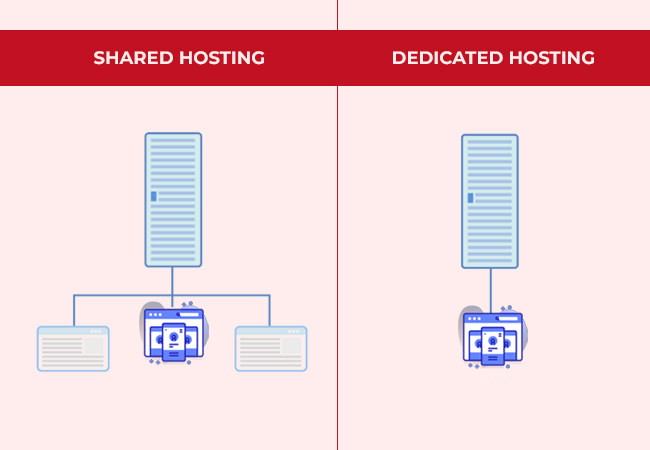VPS vs. Cloud Hosting: Which Setup Best Suits Your Business?
Table of Contents
- 1 VPS vs. Cloud Hosting: Which Setup Best Suits Your Business?
- 2 The Evolution of Hosting Solutions
- 3 What is VPS Hosting?
- 4 What is Cloud Hosting?
- 5 Key Differences Between VPS and Cloud Hosting
- 6 When to Choose VPS Hosting
- 7 When to Choose Cloud Hosting
- 8 VPS Hosting Costs
- 9 Cloud Hosting Costs
- 10 Emerging Trends in Hosting
- 11 Conclusion
- 12 Frequently Asked Questions
- 13 What is the main difference between VPS hosting and cloud hosting?
- 14 Which hosting option is better for high-traffic or unpredictable workloads?
- 15 Why should a business choose VPS hosting over cloud hosting?
- 16 How does the cost of VPS hosting compare to cloud hosting?
- 17 Is cloud hosting more reliable than VPS hosting?
Business success now depends heavily on selecting appropriate hosting solutions because such decisions fundamentally affect how businesses function online. Your hosting platform manages vital website factors, including speed and uptime, and also represents security measures as well as scalability potential, which directly impacts customer experiences and business expansion. VPS (Virtual Private Server) and cloud hosting in India operate as the two main hosting choices through which users can leverage distinct capabilities that satisfy different business requirements. India VPS hosting allows dedicated resources and maintains consistent performance, while cloud hosting delivers unmatched flexibility together with unlimited scalability potential.
This article dives deep into the features, benefits, and differences of VPS and cloud hosting, offering a detailed comparison to help you make an informed decision that aligns with your business goals. We’ll cut through the technical jargon, provide real-world examples, and map out the true costs of each option. By the end, you’ll have a clear decision framework to choose the best hosting solution for your business.

The Evolution of Hosting Solutions
The complete and full understanding of the VPS vs. cloud hosting debate depends significantly upon how hosting solutions have evolved over time. Traditionally, small websites were usually hosted on simple, entry-level shared hosting. However, as a business grew, shared hosting often became unrepresentative because it carried limited resources while giving little or no guarantee regarding its output performance. This gap led to the development of VPS (Virtual Private Server) technology, which offers a compromise: improved control, dependability, and performance with dedicated resources in a shared environment. Over time, cloud hosting emerged as a game-changing option that leveraged the interconnected network of computers to provide unparalleled flexibility, scalability, and reliability. This invention changes hosting by easily adjusting to the growing demands of contemporary companies and managing traffic variations without any issues.
What is VPS Hosting?
A Virtual Private Server, or VPS, is essentially a virtualized space created by splitting a single physical server into multiple smaller, independent servers. Think of it like dividing a large office building into individual private offices—each VPS gets its own dedicated resources, such as RAM, CPU, and storage, which are reserved exclusively for your website. Because each VPS operates in its own isolated environment, the activities of other users on the same physical server won’t affect your site’s performance. This setup gives you the reliability and control of a dedicated server without the hefty price tag.
| Advantages | Limitations |
|---|---|
| Dedicated Resources: Unlike shared hosting, your VPS resources are entirely reserved for your use. | Limited Scalability: Upgrading resources often requires downtime and manual intervention. |
| Full Control: VPS hosting offers root access, enabling custom software installations and configurations. | Technical Knowledge: Users must manage the server environment, requiring expertise in server administration. |
| Improved Security: The isolated nature of VPS minimizes the risk of data breaches caused by neighboring users. | |
| Cost-Effective: VPS hosting delivers many benefits of a dedicated server at a fraction of the cost. |
What is Cloud Hosting?
Cloud hosting is a new form of hosting that allows the storage of the website on a network of interconnected servers, popularly referred to as the cloud, as opposed to using a dedicated server. With cheap cloud hosting, servers work together to provide a scalable and highly reliable hosting service, ensuring better performance and flexibility for websites of all sizes.
| Advantages | Limitations |
|---|---|
| Dynamic Resource Allocation: Resources such as CPU and RAM are allocated based on demand, allowing seamless handling of traffic spikes. | Complexity: Managing cloud hosting requires familiarity with cloud consoles and resource optimization techniques. |
| High Availability: With redundancy built into the infrastructure, cloud hosting ensures that your website remains operational even if one server fails. | Variable Costs: Uncontrolled resource usage can lead to unpredictable expenses. |
| Global Accessibility: Servers in multiple locations reduce latency by delivering content from the nearest server to the user. | |
| Pay-As-You-Go Pricing: Businesses are charged only for the resources they consume, making cloud hosting cost-efficient for fluctuating demands. |

Key Differences Between VPS and Cloud Hosting
Understanding the core differences between VPS and cloud hosting is crucial to selecting the right solution. Below is a detailed comparison across various parameters:
- Architecture
- VPS Hosting: A physical server is divided into multiple virtual servers, each operating as an isolated environment with fixed resources.
- Cloud Hosting: A network of servers works together to form a “cloud,” dynamically allocating resources as needed.
- Example:Think of VPS hosting as leasing a flat in an apartment complex—you have a set amount of space that you can’t go beyond. Cloud hosting however, is more like staying in a hotel room that gets bigger when you need more room.
- Resource Allocation
- VPS Hosting: Resources such as RAM, CPU, and storage are fixed according to your hosting plan. This predictability is beneficial for websites with steady traffic but limits scalability.
- Cloud Hosting: Resources are pooled and dynamically allocated based on your website’s needs. This ensures consistent performance during traffic surges.
- Real-World Application: Picture an online shop holding a holiday sale. It might face sudden jumps in visitor numbers. On a VPS setup, this could cause slowdowns unless you upgrade resources by hand. Cloud hosting, though, grows on its own to deal with the extra load.
- Scalability
- VPS Hosting: Scaling resources involves manual upgrades and potential downtime.
- Cloud Hosting: Scaling occurs automatically and in real time, making it an excellent choice for rapidly growing businesses.
- Scenario: When a startup kicks off a viral marketing campaign, it might see a sudden surge in website traffic. Cloud hosting makes sure the service stays up and running by increasing resources as needed. On the other hand, VPS hosting might need upgrades that take a while causing issues.
- Performance
- VPS Hosting: Performance is consistent as long as resource limits are not exceeded. However, during high traffic, the server may slow down or crash.
- Cloud Hosting: Load balancing and resource distribution ensure superior performance, even during peak traffic.
- Performance Insights: A media-rich website that serves users worldwide gets faster loading times when it uses cloud hosting because it spreads out traffic over servers far apart. But, VPS hosting might have trouble with slow response times.
- Cost Comparison
- VPS Hosting: Predictable Pricing VPS hosting operates on a fixed monthly pricing model, making it easy for businesses to plan their expenses. This consistency is ideal for small businesses with steady traffic and predictable resource requirements. Plans typically range from ₹489 per month to ₹21998 per month, depending on the resources allocated. Additional costs may apply for features like extra storage, backups, or managed services.
- Cloud Hosting: Flexible and Variable Costs Cloud hosting uses a pay-as-you-go pricing structure, where businesses are charged based on actual resource usage. This flexibility makes cloud hosting a practical choice for businesses with fluctuating demands, such as e-commerce sites during seasonal sales or flash promotions. Costs may vary monthly, depending on how much CPU, memory, storage, or bandwidth is consumed.
- Streamlined Decision-Making: VPS Hosting works best for businesses seeking predictable pricing and steady traffic. It allows for better budgeting without surprises.Cloud Hosting is ideal for businesses requiring scalability and dynamic resource allocation to handle sudden traffic surges. Although the costs can fluctuate, this approach prevents performance degradation during high-demand periods.
- Reliability
- VPS Hosting: Relies on a single physical server, making it vulnerable to hardware failures. Downtime can occur if the server encounters issues.
- Cloud Hosting: Redundant infrastructure ensures high availability. If one server fails, others take over, minimizing downtime.
- Uptime Guarantee: Providers of cloud hosting ensure an uptime of 99.99%. In contrast, VPS hosting might face some downtime now and then, since it relies on just one server.
- Security
- VPS Hosting: Provides an isolated environment with customizable security features. However, users are responsible for updates and configurations.
- Cloud Hosting: Offers built-in security measures like DDoS protection, firewalls, and automated backups. Shared infrastructure may pose minor risks if not properly managed.
- Security Evaluation: VPS hosting provides improved separation and needs folks with tech know-how for keeping things safe. On the flip side, cloud hosting brings many safety features on autopilot, which serves up convenience for the non-geek crowd.
Hosting expenses vary based on a bunch of stuff like vCPUs, memory, how much storage you need, the bandwidth, those load balancer things, and extra stuff like backups and DDoS protection. Different types of hosting got their own way of figuring out the price so they work for different kinds of business stuff you need.
By aligning your hosting choice with your business’s traffic patterns and budget priorities, you can optimize both costs and performance.
When to Choose VPS Hosting
VPS hosting is an excellent choice for businesses that prioritize stability and cost-effectiveness. It is best suited for:
- Small to Medium-Sized Businesses: Companies with predictable traffic patterns can benefit from VPS hosting’s dedicated resources and consistent performance.
- Technical Control: Businesses requiring root access for custom server configurations and software installations.
- Budget-Friendly Hosting: VPS hosting provides a cost-effective solution for steady workloads, balancing affordability with reliability.
When to Choose Cloud Hosting
Cloud hosting is ideal for businesses that need flexibility and scalability to manage dynamic workloads. It is the right choice for:
- Rapidly Growing Startups: Startups experiencing unpredictable growth or fluctuating traffic can scale resources on demand without downtime.
- E-Commerce Platforms: Websites that handle seasonal sales or promotional campaigns benefit from cloud hosting’s ability to accommodate sudden traffic spikes seamlessly.
- Global Reach: Businesses targeting international audiences gain from cloud hosting’s geographic redundancy, reducing latency and ensuring high availability.
VPS Hosting Costs
VPS hosting offers predictable pricing plans, making it easy for businesses to budget their expenses:
| Plan | Price (₹/Month) | Specifications |
|---|---|---|
| Lite Plan | ₹489 | 2 Core, 4GB RAM, 50 GB NVMe SSD, 4TB Bandwidth |
| Enterprise Plan | Starts @ ₹6,928 | 8 Core, 8GB RAM, 250 GB NVMe SSD, 4TB Bandwidth |
| Premium Plan | ₹11,996 | 32 Core, 64GB RAM, 960 GB NVMe SSD, 128 TB Bandwidth |
| Managed Support | ₹800 | Additional cost per month for managed support |
Cloud Hosting Costs
Cloud hosting follows a pay-as-you-go model, allowing businesses to scale costs based on their resource usage:
| Plan | Price (₹/Month) | Hourly Rate (₹/Hr) | Specifications |
|---|---|---|---|
| CPU Optimized Plan | Starts @ ₹1,237 | ₹1.51 | 2 Core, 4 GB RAM, 25 GB NVMe SSD, 4TB Bandwidth |
| Memory Optimized Plan | Starts @ ₹3,025 | ₹3.70 | 2 Core, 16 GB RAM, 50 GB NVMe SSD, 4TB Bandwidth |
Emerging Trends in Hosting
The hosting industry is constantly changing, providing revolutionary solutions for today’s businesses. Several analytically important trends consist of:
- Hybrid hosting : Blends the dedicated resources of VPS hosting and the scalable flexibility of cloud hosting and this blend provides optimized performance and cost management.
- Edge computing : processes an important amount of data closer to its users, thus substantially decreasing latency and considerably improving user experience.
- AI-driven automation: It uses artificial intelligence to ease predictive scaling and resource optimization, guaranteeing cost-effective and consistent performance.
Conclusion
Your hosting solution depends on your business needs and how you plan to grow.
VPS hosting suits businesses experiencing consistent website traffic that need reliable expenses and exclusive resources.
Businesses with analytically important dynamic workloads benefit considerably from Cloud hosting, as it offers the large flexibility and scalability needed to handle considerably fluctuating traffic.
HostingRaja offers several customized VPS solutions and they provide many cloud hosting solutions to aid businesses in achieving growth. Contact us today for a thorough, individualized consultation to determine the optimal hosting solution for all your needs.
Frequently Asked Questions
What is the main difference between VPS hosting and cloud hosting?
VPS hosting uses a single physical server divided into multiple virtual servers, each with fixed resources. Cloud hosting, on the other hand, uses a network of interconnected servers to provide dynamic resource allocation, scalability, and higher reliability.
Which hosting option is better for high-traffic or unpredictable workloads?
Cloud hosting is ideal for high-traffic or fluctuating workloads because it can automatically scale resources in real time. This ensures smooth performance during sudden traffic spikes without downtime.
Why should a business choose VPS hosting over cloud hosting?
VPS hosting offers predictable pricing, dedicated resources, and full server control, making it a cost-effective choice for businesses with steady traffic and technical expertise for server management.
How does the cost of VPS hosting compare to cloud hosting?
VPS hosting typically has fixed monthly pricing, which is easier for budgeting. Cloud hosting uses a pay-as-you-go model, where costs vary depending on actual resource usage, offering flexibility but less predictability.
Is cloud hosting more reliable than VPS hosting?
Yes. Cloud hosting provides high availability through redundancy—if one server fails, another takes over instantly. VPS hosting depends on a single physical server, making it more vulnerable to downtime from hardware issues.
-

KINGSTON AJITH
Senior Content Writer @ HostingRajaA seasoned Senior Content Writer with over 5 years of experience in the tech industry, specializing in web hosting. Passionate about creating unique, high-quality content for articles, blogs, and web pages. As a dedicated learner, continually improving writing skills and overseeing all online content and communications to ensure quality and consistency.
